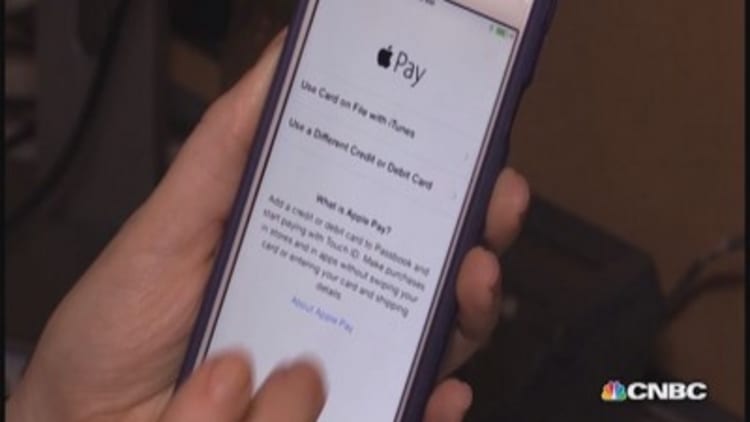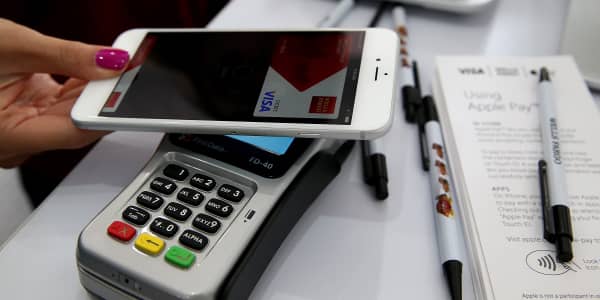Apple may already be in mobile payments, but the mobile wallet wars are just beginning.
Competitors will be stepping up their game to gain mobile market share and at least one (if not more) also will become a leader in the mobile payment market.
Read More With Apple Pay, tech giant bets big on mobile payments
"Right now they are the only ones really succeeding in this space. Today they are dominant, but they won't be the only big player forever," said John Haro, CTO of mobile marketing firm Vibes. "They would love 100 percent market share, but that's just not going to happen."
Apple's mobile wallet rivals

Last week it looked like Apple Pay's biggest competitor in mobile payments might be the retailers themselves.
A group of retailers called the Merchant Customer Exchange (MCX) is developing its own mobile wallet called CurrentC, which it plans to launch sometime next year. Last week some members of MCX, including CVS and Rite-Aid, began disabling support for Apple Pay at their stores, likely because merchants who choose to work with MCX are required to do so exclusively.
But the tides shifted when MCX announced on Wednesday that CurrentC, which is currently in beta, had been breached and some users' emails had been stolen by an unauthorized third party.
Read MoreApple Pay competitor CurrentC says customer email addresses were hacked
"What happened with CurrentC is incredibly unfortunate for them. There was already some backlash because some retailers turned off support for Apple Pay, but the breach, even though it was just emails, will set it back," Haro said.
Read More Wal-Mart and allies face off with Apple Pay over mobile payments
"In the world of payments, it's a pretty big blow because it sends a message about CurrentC's security," he said.
But Apple's competition doesn't end with CurrentC. Tech companies like Google and PayPal, who already have mobile wallets on the market, are ramping up their efforts in the space. Google is even reportedly launching an ad campaign this quarter for Google Wallet.
While marketing may have some sway on consumers, people will likely choose a mobile wallet based on what mobile ecosystem they are already most familiar with, said Carolina Milanesi, chief of research at Kantar Worldpanel ComTech.
"It depends on what kind of customer you are. If you are already an Apple user, then this is a no-brainer; you will use Apple Pay," Milanesi said. "But if you are in the Android world, first you would need to jump ship with the OS to use Apple Pay, and that's a big step."
One of Apple Pay's limitations is that it is only available to iPhone 6 users for in-store purchases, whereas Google Wallet and other mobile payment apps are available on both iOS and Android.
But even though this may give competitors some advantage, Apple Pay still has a few things on its competitors that are giving it a clear lead.
Apple's edge
While Apple was not the first tech company to tackle mobile payments, it has gained adoption more quickly than its predecessors, industry experts said.
Google Wallet launched in 2011, and PayPal's mobile payment feature launched on its app in 2013. Neither Google nor PayPal would share how many mobile wallet app users they have. But just a week after Apple launched its mobile payments system, it had already boasted more than 1 million activations.
"We're already No. 1. We're more than the total of the other guys," .
Read MoreApple's Tim Cook: 'I'm proud to be gay'
According to a recent study from market research firm Lab42, almost half (45 percent) of U.S. smartphone owners (non-iOS devices) would be willing to switch to an iOS device to get to use Apple Pay.
I think Apple has leapfrogged the competition and is now the 800-pound gorilla in the space.Lou Basenesefounder of Disruptive Tech Research
Apple Pay is gaining traction for two big reasons: convenience and security.
"It really comes back to the path of least resistance. Apple has the quickest, most simple solution. If making mobile payments becomes too many steps, then people won't use it," said Lou Basenese, founder of Disruptive Tech Research.
Unlike some rival mobile wallets, Apple Pay does not require users to even open an app for use. The user can just hold the iPhone 6 near the contactless reader while holding their finger on the Touch ID to make a transaction.
Apple's approach to security is also a big driver for its adoption among banks, retailers and consumers.
The tokenization system built into Apple Pay is considered one of the most secure, fraud-proof ways to make payments, because it keeps consumers' actual credit card data from ever entering a retailer's point-of-sale system. Not to mention, it also uses Touch ID for biometric verification, which adds another layer of protection.
Read MoreHow hackers could still get around Apple Pay security
Unlike Google Wallet and other competitors, Apple Pay also does not track any of the user's purchasing data. Given consumers' growing privacy concerns, this also gives Apple an edge in the space, Haro said.
"There are a lot of players that have been trying to unlock the security and simplicity obstacles for mobile payments. They have all failed to do that so far. Apple has been the only one able to do it," Basenese said.
"I think Apple has leapfrogged the competition and is now the 800-pound gorilla in the space."



